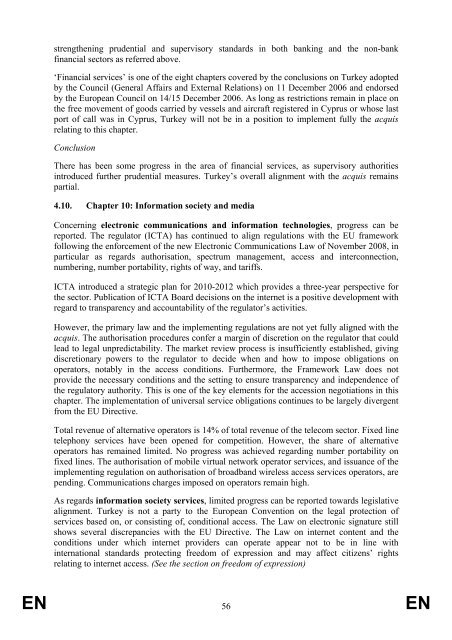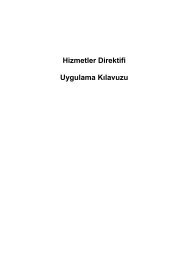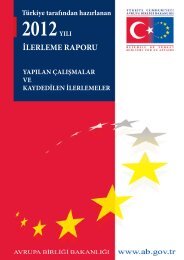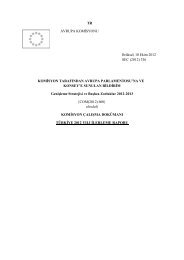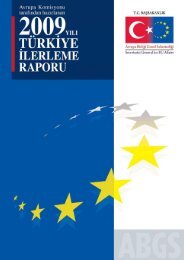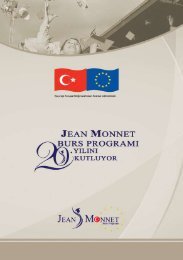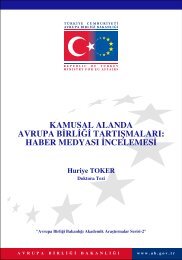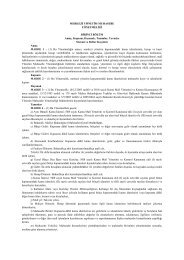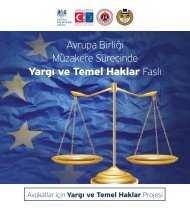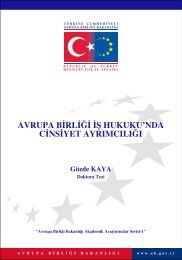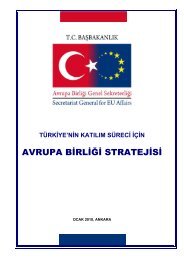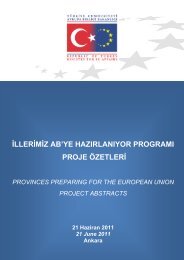2010 ilerleme raporu - Avrupa Birliği Bakanlığı
2010 ilerleme raporu - Avrupa Birliği Bakanlığı
2010 ilerleme raporu - Avrupa Birliği Bakanlığı
You also want an ePaper? Increase the reach of your titles
YUMPU automatically turns print PDFs into web optimized ePapers that Google loves.
strengthening prudential and supervisory standards in both banking and the non-bankfinancial sectors as referred above.‘Financial services’ is one of the eight chapters covered by the conclusions on Turkey adoptedby the Council (General Affairs and External Relations) on 11 December 2006 and endorsedby the European Council on 14/15 December 2006. As long as restrictions remain in place onthe free movement of goods carried by vessels and aircraft registered in Cyprus or whose lastport of call was in Cyprus, Turkey will not be in a position to implement fully the acquisrelating to this chapter.ConclusionThere has been some progress in the area of financial services, as supervisory authoritiesintroduced further prudential measures. Turkey’s overall alignment with the acquis remainspartial.4.10. Chapter 10: Information society and mediaConcerning electronic communications and information technologies, progress can bereported. The regulator (ICTA) has continued to align regulations with the EU frameworkfollowing the enforcement of the new Electronic Communications Law of November 2008, inparticular as regards authorisation, spectrum management, access and interconnection,numbering, number portability, rights of way, and tariffs.ICTA introduced a strategic plan for <strong>2010</strong>-2012 which provides a three-year perspective forthe sector. Publication of ICTA Board decisions on the internet is a positive development withregard to transparency and accountability of the regulator’s activities.However, the primary law and the implementing regulations are not yet fully aligned with theacquis. The authorisation procedures confer a margin of discretion on the regulator that couldlead to legal unpredictability. The market review process is insufficiently established, givingdiscretionary powers to the regulator to decide when and how to impose obligations onoperators, notably in the access conditions. Furthermore, the Framework Law does notprovide the necessary conditions and the setting to ensure transparency and independence ofthe regulatory authority. This is one of the key elements for the accession negotiations in thischapter. The implementation of universal service obligations continues to be largely divergentfrom the EU Directive.Total revenue of alternative operators is 14% of total revenue of the telecom sector. Fixed linetelephony services have been opened for competition. However, the share of alternativeoperators has remained limited. No progress was achieved regarding number portability onfixed lines. The authorisation of mobile virtual network operator services, and issuance of theimplementing regulation on authorisation of broadband wireless access services operators, arepending. Communications charges imposed on operators remain high.As regards information society services, limited progress can be reported towards legislativealignment. Turkey is not a party to the European Convention on the legal protection ofservices based on, or consisting of, conditional access. The Law on electronic signature stillshows several discrepancies with the EU Directive. The Law on internet content and theconditions under which internet providers can operate appear not to be in line withinternational standards protecting freedom of expression and may affect citizens’ rightsrelating to internet access. (See the section on freedom of expression)EN 56 EN


